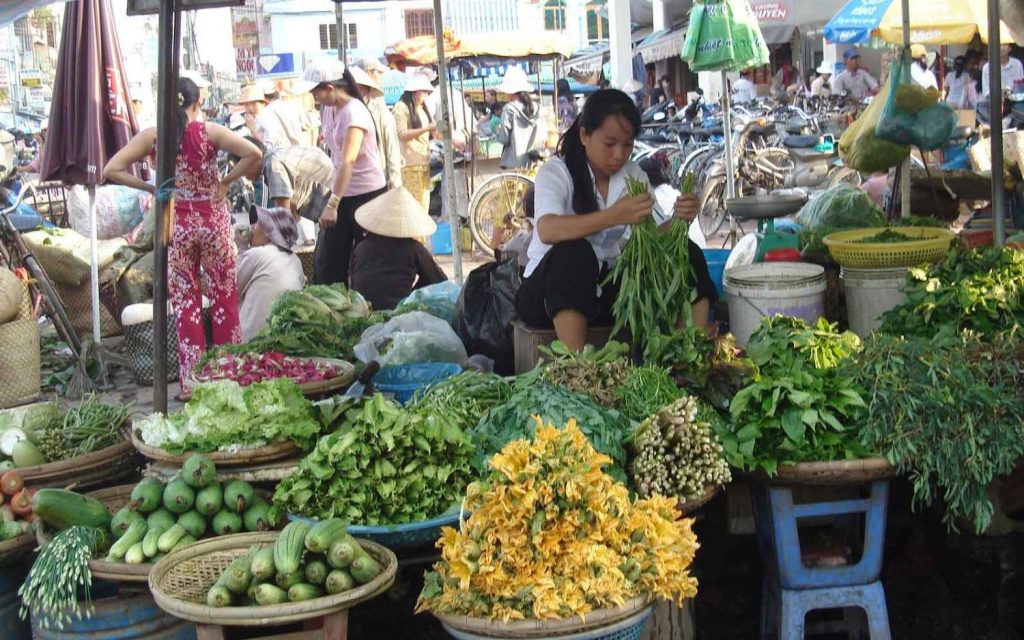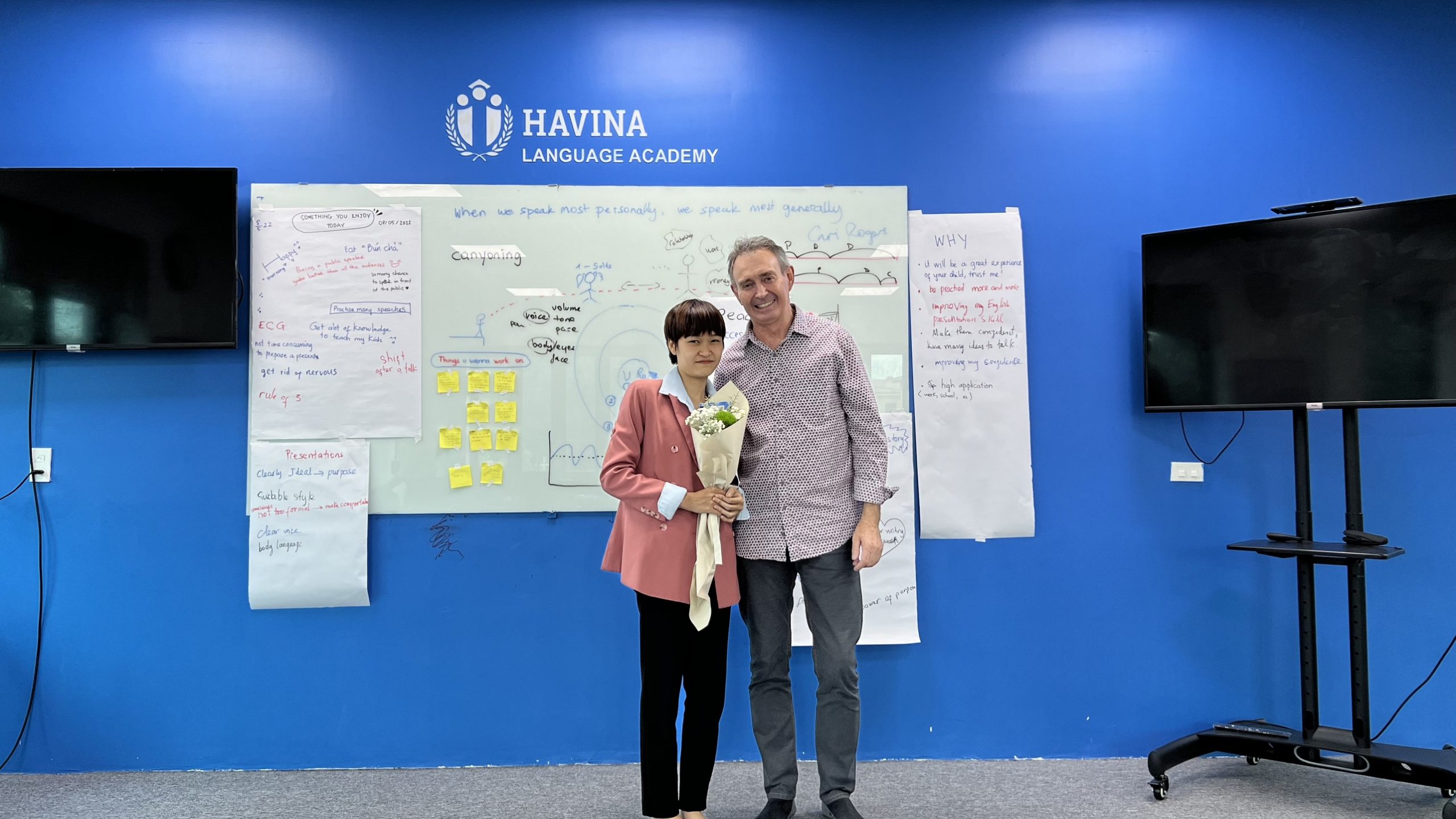A response for one. And more?
In the first half of 2022, I ran a public speaking course for staff of an education company in Vinh Yen, a city about 30 kilometres north of Ha Noi. What I hadn’t expected was how passionate the participants would be in taking the opportunity and use their new skills to speak with such soul-searching about the environment and the future.
That company, Havina, is one of many such private education providers that deliver English language skills and public speaking and presentation courses. The participants were not teachers. Instead, they had responsibilities in marketing, administration, IT, communications and design. A wonderful bunch of people.
The course emphasised the importance of speaking up – not just in terms of volume and projection, but also in terms of speaking up about things that matter.
One week after the final session, I received an email from one participant saying that the training was fun and effective. Mai Lan also said it helped her writing. Speaking and writing are expressions of thinking, so any work that helps clarify thinking is going to have rewards in a number of areas.
Another week later, Mai Lan wrote to say she had turned her gaze on her own actions. She was reflecting on her thoughts and actions in the intense summer heat of Vinh Yen. What she saw troubled her. Under a subject line that read, “Some thoughts bother me all these days” Mai Lan sent this:
A couple of days ago I went home at noon from work and it was boiling hot. For a moment, I thought this Earth is crazy. There really is something wrong with the environment right now. Global warming is really happening, on my face, on my eyes, and on my fingertips. My eyes got so dry and they can hardly open. But, it was like this for only one moment. All those thoughts, all those worries, and all that panic happened in 30 seconds. When I got to my room and fell onto my bed, the aircon soothed all the discomfort and got me back to the stage of being indifferent. It was not until I was 18 and went to university in Hanoi city that I had first-hand experience staying in a room with aircon. All these years before that I grew up spending most of the day under the sun. I hated summer for the heat, and I hated winter even more for the cold. You know how severe the weather in the North of Vietnam is, don't you? However, since (maybe) the pandemic happened and I started to work from home and switched to hybrid work, I had so little sense of how the weather was changing. I could maintain an ideal temperature no matter what it was like outside my room. I gradually lost the sense of the weather. It happens to other aspects, too. When Hanoi flooded a couple of weeks ago, I was in Vinh Phuc. Then it was Vinh Phuc's turn, and I was in Hanoi. All the time when all the flooding happened, I only knew through photos on Facebook. It was disgusting, of course, but it didn’t really affect me. I was lucky not to experience those times, or was I? I think that's the case for a lot of other people. The richer people are, the better conditions of their lives are, and the less they feel about the severe changes in the environment because money has been paid to deal with all these problems and put people into the ideal state of short-term pleasure. "The globe is warming but my room is getting cooler. Why even bother anymore?" Sadly, rich people are often those whose words are powerful. They have the knowledge, skills, and capital to create big changes. A vendor who sells fruits in Vinh Yen market simply has no idea what is happening, and who the stakeholders are. Those who suffer the most don't even know that there are other options and other scenarios. More sadly, I'm writing this email with little motivation to make any change. The aircon is running above my head and I look at myself as a hypocrite. Disappointedly, Mai Lan


Such a heartfelt personal dilemma that speaks for us and to us.
I am certain that many of us have been asked questions and have made comments similar my friend’s. Questions and comments about the challenges of the personal within the global. Questions about what to do and how to do it. Questions that sometimes imply hypocrisy.
How would you respond?
Here’s a short version of my response – written with the help of friends in Australia.
Dear genuine human Mai Lan
You are not alone in feeling that hypocrisy. Many people are. I am confronted with it every day. I feel guilt. Many of us who work in environmental education are conflicted by the gap between what we know and what we practice. Between values and actions.
This may sound trite but … the best we can do is the best we can do. And… we cannot do everything and be perfect all the time.
Here are some thoughts…
We must live as lightly as we can on the planet. As often as we can. Choices are shaped, valued, and restricted by culture and infrastructure and law and community values. Choose as light as possible as often as possible.
One challenge is that living in awareness of the choices and their impacts highlights the contradictions. Most people don't think about them. Or - as you say - are not in a position to do anything more eco-friendly. Again, choices are limited or opened by circumstances.
Can we live in ways that minimise the contradictions between what we know and what we do? Can we remove them all? Probably not. But being conscious of them is a start. And we can work on them, one by one, in how we treat other people, ourselves, other species, and the planet.
Another challenge is accepting that individuals cannot alone fix the world.
A lot of dedicated, caring, compassionate, planet-friendly people lose heart because of the scale and complexity of the problems. Mai Lan, don’t do that!
The solution is to inspire others to think and feel and act for a sustainable future. And accept that change for the better can be very, very slow coming. Plant the seeds of care and advocacy. Use your voice and your new skills. Let future generations bear the fruit of good works you do now. And, of course, take whatever actions you can right now – they will add integrity and inspiration.
I think we also need to acknowledge that we are currently the victims of previous and present government inaction and global, corporate greed. In my country and the West - over two centuries of government failures – at political, economic, environmental, ethical, and social levels. Failures, total failures. In most cases, our governments have betrayed us and committed deliberate crimes against people and planet.
But playing victim is not an excuse. Being aware is a reason to change – not just our personal actions but government policy. Sadly, people in the West claim 'powerlessness' as their get-out-of-gaol-free card. An excuse for inaction.
We need to work to change policy – not just personal practices. Change at all levels is required. A mammoth task, but essential. I am uncertain what that means for action in Viet Nam.
The work you and I both do in education is vital for helping others make better choices in personal and political spheres of life – choices made in the supermarket and in the polling booth (I am talking of course about the democratic system in Australia).
Education is a necessary ingredient, but it has to be the right sort of education!
And this has been my focus: to encourage systems to re-think the very purpose of education. Not what your country and my country have been doing for decades.
In my country, education is designed to protect the status quo whilst giving some token acknowledgement to sustainability and to the importance of protecting nature. It must change, but the forces preventing meaningful change are strong. Sustainability must become the purpose of education.
Leo [CEO of Havina] has expressed an interest in working out how the Sustainable Development Goals can be more central to the purpose of Havina’s education work. Havina could lead the way with a strong sustainability purpose… and others could follow.
So many other issues we could discuss. Soon. I hope. In the meantime, keep company with others who care as you do, and contribute to parallel community-driven structures that fill the gaps and heal the wounds left by governments.
Mai Lan, let me finish with this quote from Marlon Brando, an American actor from the 20th century. I saw it recently on Facebook.
The view is better from a greater age… I think the mistake we make – certainly the mistake I made – was to think too small, too safe. I think that life was meant to be big. I think that people were meant to be big. I don't mean through gesture or demands I mean big of heart and impact. We are here for a very short run of the timeline, and if a mark isn't made, if people aren't helped or moved by what we've done, then we haven't mattered. Show up to matter, not to be liked. Show up to be big. Investigate your heart and the hearts of others to find out what the big thing needed at that time might be.
Marlon Brando, interview with James Grissom, 1990
Step up. Speak up. Be big.
With care, Phil
Here’s my friend’s response to my email:
I never wanted to do big things or create big changes. I always found that idea too ambitious and too ideal. For the very first time in my life, I feel there is a teeny tiny possibility that I’m capable and want to be big. Thank for your email, Phil. With care, too. Mai Lan
Feature image: Mai Lan and Phil Smith at the Havina Language Academy, Vinh Yen, Vietnam. Photo supplied



